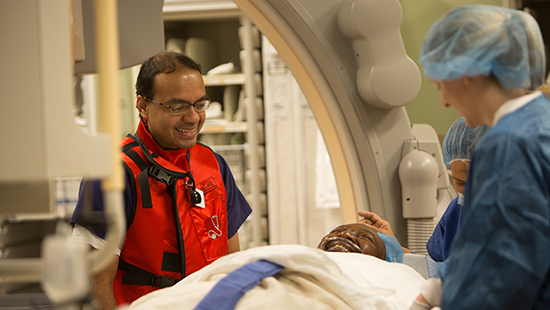Pulmonary Hypertension

Pulmonary hypertension (PH) is a lung disorder that occurs when the blood pressure in the arteries which carry blood from the heart to the lungs (pulmonary arteries) rises above normal levels.
The increased pressure makes your right heart work harder to pump blood through the lungs. As a result, the right side of the heart becomes enlarged and weak, which can lead to heart failure.
People with PH often have few or subtle symptoms until the disease has progressed, which can lead to a more difficult diagnosis and possibly dangerous health consequences. Most cases are chronic, meaning it is a lifelong disease, and it requires long-term monitoring.
At the University of Maryland Pulmonary Hypertension Center of Comprehensive Care, our interdisciplinary team of PH specialists – which includes pulmonologists, cardiologists, and a nurse practitioner – are experts at diagnosing and treating PH, even with patients who have complex, advanced forms of the disease.
We are also experts at PTE surgery, an advanced treatment option and potential cure for chronic thromboembolic pulmonary hypertension (CTEPH).
To make an appointment or to learn more about our program, call 410-328-7260.
Pulmonary Hypertension Diagnosis
Pulmonary hypertension is difficult to diagnose in its early form and often may not be discovered during a routine physical exam.
Our imaging specialists will perform a series of tests to show how your heart and lungs are working. These tests help determine the cause and severity of PH, and help in developing a treatment plan.
Tests may include:
- Electrocardiogram (ECG): This allows our team to see the electrical signals in your heart. We may ask you to wear a device for a day, or several days, give us data on how your heart's electrical signals work over a period of time.
- Ventilation/perfusion scan: This is a nuclear lung scan and is sometimes referred to as a VQ scan. It measures breathing (ventilation) and circulation (perfusion) in the lungs. This study detects new or chronic blood clots in the lungs.
- Echocardiogram: This is an ultrasound of the heart that allows us to see your heart beating and pumping blood in real time.
- Right heart cardiac catheterization: This is the only test that accurately measures the pressures in the arteries of the lung. A right heart catheterization should be done in all patients to confirm the diagnosis of PH. The procedure is done in the cardiac catheterization lab. A catheter is inserted into your right neck vein, arm, or groin, and is advanced to the heart and lungs where pressure measurements are obtained. The pressure measurements let your doctor know if you have pulmonary hypertension, what type, the severity, and the best treatment option for you.
Because pulmonary hypertension can run in the family, a genetic test can also help determine if you have ir or if you are at risk. Ask our team about how to schedule genetic testing.
Types of Pulmonary Hypertension
- Chronic Thromboembolic Pulmonary Hypertension (CTEPH): This is a condition where blood clots result in narrowing of the pulmonary arteries. If the blood clots do not fully dissolve, they can cause PH. University of Maryland specializes in treating CTEPH using a procedure called pulmonary thromboendarterectomy (PTE), the only known cure for CTEPH.
- Pulmonary Arterial Hypertension (PAH): This is a condition where the arteries that supply blood to the lungs become narrow. This increases the resistance to blood flow, resulting in higher lung pressures.
- PH Due to Left Heart Disease: A condition where disorders of the left side of the heart, such as left heart failure, heart stiffening and valvular heart disease can result in PH.
- PH Due to Lung Disease: This is a condition where diseases that affect the lung tissue result in pressure elevation. These include obstructive sleep apnea, chronic obstructive pulmonary disease, and interstitial lung disease.
- Miscellaneous: This includes a heterogeneous group of disorders, including kidney disease, and anemias, which can cause PH of varying severity.
Pulmonary Hypertension Treatment
Depending on the type and severity of your PH, we may suggest different treatment options. We evaluate each patient individually, and our team of pulmonologists and cardiologists will create a treatment plan specific to your needs. This may include:
- Medications: There are many medication options available to you. Our patients have many more options than in the past that have led to improved life expectancy. The goal of medical treatment is to slow disease progression and improve your symptoms. We will discuss the possible medications with you and create a personalized plan for you.
- Pulmonary thromboendarterectomy (PTE) Surgery: This is the only known cure for CTEPH. We are one of the few medical centers in the country offering this procedure. Learn more about PTE surgery.
- Lung transplant: If the medications are not providing sufficient relief, we will discuss a lung transplant evaluation. Learn more about lung transplant.
- Clinical trials: Our patients have the opportunity to participate in clinical trials, which means access to the latest drugs and therapies before they are available to the general public.
Make an Appointment
At the University of Maryland Pulmonary Hypertension Center of Comprehensive Care, our team are leaders in diagnosing and treating PH. Call 410-328-7260 for an appointment with a PH specialist.

